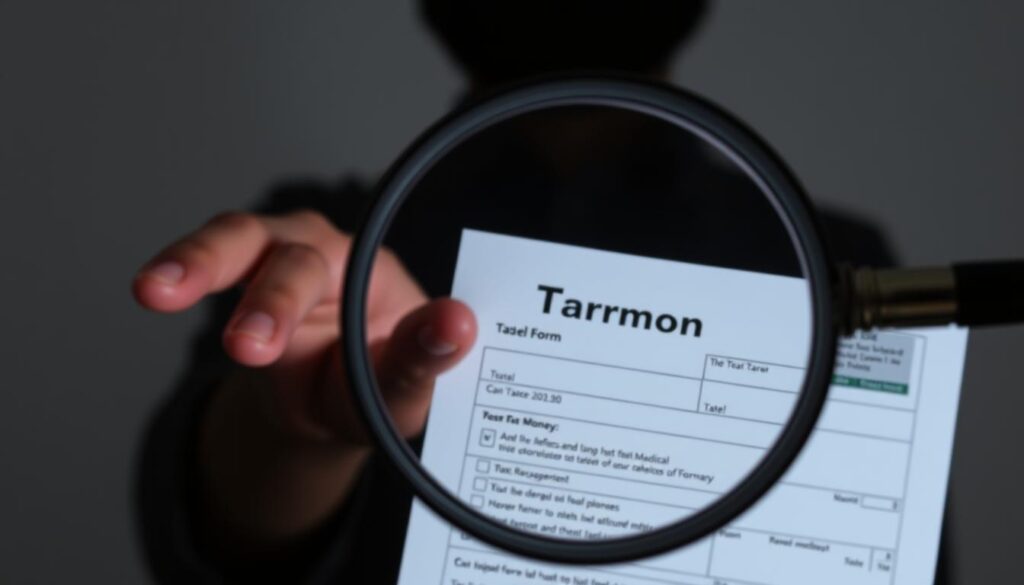Tax season can be exciting if you’re expecting a refund. But what if you owe money? Your tax refund might be at risk. The situation depends on who you owe and why.
The IRS and state tax agencies can garnish tax refunds for certain debts. This is called tax refund garnishment. They intercept your refund before it reaches you.
Federal agencies use the Treasury Offset Program to collect overdue debts. State governments have their own laws for garnishing refunds. However, private debt collectors usually can’t claim your tax refund directly from the IRS.
Key Takeaways
- Tax refund garnishment is legal for specific debts
- The IRS and state agencies can intercept refunds
- Federal debts may be collected through the Treasury Offset Program
- State laws vary on refund garnishment practices
- Private debt collectors typically can’t directly take your tax refund
Understanding Tax Refund Garnishment
Tax refund garnishment affects many Americans yearly. It’s vital to know how this system works. Understanding which debts can lead to refund interception is crucial.
What is tax refund garnishment?
Tax refund garnishment is when the government takes your refund to pay off debts. This process, called a tax offset, allows agencies to collect unpaid obligations.
Federal and state agencies can take money directly from your refund. This happens before you receive any funds.

Types of debts subject to garnishment
Several types of debts can result in your tax refund being garnished:
- Federal debts, including unpaid taxes
- State taxes owed
- Child support arrears
- Defaulted student loans
Legal framework for refund interception
The Treasury Offset Program (TOP) oversees federal tax refund garnishments. This program allows government agencies to collect debts through refund interception.
State laws may also apply to certain debts. These laws often cover state tax debts or child support obligations.
| Debt Type | Governing Agency | Legal Authority |
|---|---|---|
| Federal Taxes | IRS | Internal Revenue Code |
| Student Loans | Department of Education | Higher Education Act |
| Child Support | State Child Support Agencies | Social Security Act |
| State Taxes | State Revenue Departments | State Tax Laws |
Knowing about tax refund garnishment can help you avoid potential issues. It allows you to take steps to protect your refund if needed.
Federal Agencies with Garnishment Authority
Several federal agencies can intercept your tax refund. The IRS leads the pack, collecting unpaid federal taxes directly from your refund. This power helps them recover outstanding debts efficiently.
The Department of Education also has garnishment authority. They can ask the IRS to offset your refund if you’ve defaulted on federal student loans. This method helps recover educational debts quickly.

Child Support Enforcement Agencies complete the trio of major federal entities. They ensure parents meet their financial obligations to their children. If you’re behind on child support, they can tap into your tax refund.
| Federal Agency | Reason for Garnishment |
|---|---|
| IRS | Unpaid federal taxes |
| Department of Education | Defaulted federal student loans |
| Child Support Enforcement Agencies | Past-due child support |
These agencies use the Treasury Offset Program. This system allows them to request IRS interception of tax refunds. It’s an efficient way to address federal debts without court intervention.
State Government’s Role in Tax Refund Interception
State governments can take your tax refund for various reasons. These include unpaid state taxes and child support enforcement. Each state has its own laws for this process.
State-Specific Laws and Regulations
States have different rules for tax refund interception. These laws cover which debts can be garnished and how agencies must act. Some states may focus on child support debts first.
Common Reasons for State-Level Garnishment
State governments often take tax refunds for:
- Unpaid state taxes
- Overdue child support payments
- Defaulted state-sponsored student loans
- Unemployment benefit overpayments
Notification Process for State Garnishments
States usually tell taxpayers before taking their refund. They send a letter explaining the debt and amount to be taken. Some states have websites where you can check your refund status.
“State tax refund interception is a powerful tool for collecting delinquent debts and ensuring compliance with state financial obligations.”
Knowing your state’s laws can help you handle the tax refund process better. Stay informed about possible garnishments to avoid surprises.
Non-Governmental Entities and Tax Refund Claims
Private creditors can’t directly take your tax refund. However, they have other methods to collect unpaid debts. These include legal action by credit card companies, medical providers, and private student loan lenders.
To collect debts, these entities typically follow a process:
- File a lawsuit against the debtor
- Obtain a court judgment
- Seek ways to enforce the judgment
After getting a court judgment, creditors may try to seize your tax refund from your bank account. This is called a bank levy. They might also pursue wage garnishment, taking part of your paycheck.
| Action | Description | Impact on Tax Refund |
|---|---|---|
| Bank Levy | Seizure of funds from bank account | Can affect refund once deposited |
| Wage Garnishment | Portion of paycheck taken | No direct impact on refund |
| Direct IRS Garnishment | Not available to private creditors | No impact on refund |
Deal with debts quickly to avoid legal issues. If you’re facing possible legal action, get professional advice. This can help protect your assets, including your tax refund.
The Process of Tax Refund Garnishment
Tax refund garnishment follows a structured process. It ensures fairness and legal compliance when collecting debts through tax refunds. Let’s look at the key steps involved.
Establishing Legal Right to Garnish
Creditors must prove their legal right to garnish a tax refund. This involves showing valid debt documents and getting a court judgment. The process starts only after meeting these requirements.
IRS Notification and Verification
After establishing legal right, the creditor notifies the IRS. The IRS then checks the debt claim’s accuracy. They send notices to inform taxpayers about possible garnishment.
Taxpayer Communication and Dispute Options
Taxpayers receive information about the garnishment. They can dispute the claim or ask for debt verification. This phase allows for fixing issues before garnishment happens.
- Review IRS notices carefully
- Gather proof of payment or debt inaccuracies
- Respond promptly to dispute unfair claims
Knowing these steps helps taxpayers handle the garnishment process better. It’s vital to stay informed and act fast.
This knowledge protects your rights and financial interests. Take action quickly if you receive a garnishment notice.
Can Debt Collectors Take Your Tax Refund?
Private debt collectors can’t directly claim your tax refund from the IRS. Only federal and state agencies have this power for specific debts. Your refund is safe from private collectors initially.
However, once deposited into your bank account, your refund becomes vulnerable. If there’s a court judgment against you, collectors might try to access these funds.
- Private collectors can’t intercept refunds directly from the IRS
- Government agencies can garnish refunds for certain debts
- Deposited refunds may be at risk if there’s a court judgment
- Understanding your rights is essential for tax refund protection
Stay informed about your financial situation. If you’re worried about collection actions, consider seeking legal advice. You might also explore debt settlement options to protect your tax refund.
| Entity | Can Directly Take Tax Refund? | Can Pursue Deposited Funds? |
|---|---|---|
| Private Debt Collectors | No | Yes (with court judgment) |
| Federal Government Agencies | Yes | Yes |
| State Government Agencies | Yes | Yes |
Protecting Your Tax Refund from Garnishment
Safeguarding your tax refund from garnishment is vital. Understanding your options and getting expert help can protect your hard-earned money.
Proactive Steps to Avoid Garnishment
Address outstanding debts quickly to prevent garnishment. Set up payment plans with creditors to show good faith. This may help you keep your refund.
Look into debt resolution options for relief. These can also protect your tax return from garnishment.
Legal Options for Challenging Garnishment
If facing garnishment, you have legal options. Dispute the debt if you think it’s wrong. File paperwork to challenge the garnishment in court.
Act fast when contesting these actions. Time is crucial in these situations.
Negotiating with Creditors
Talk to creditors to prevent garnishment. Explain your finances and suggest a fair repayment plan. Many prefer direct talks over legal action.
Be ready to show financial documents. This supports your case during negotiations.
“Proactive negotiation often leads to more favorable outcomes than waiting for garnishment to occur.”
Ask a tax pro for help with tricky situations. They can explain your rights and protect your refund.
With the right approach, you can solve debt issues. This way, you can keep your tax refund safe.
Impact of Debt Settlement on Tax Refunds
Settling debts can bring relief, but it may affect your tax refunds. The forgiven amount can become taxable income. This could increase your tax bill and reduce future refunds.
Creditors report forgiven debts over $600 to the IRS using Form 1099-C. This form tells the IRS about your debt forgiveness. The government sees this as income, which might increase your taxable income.
Here’s how the process works:
- You settle a debt for less than the full amount
- The creditor forgives the remaining balance
- If the forgiven amount is over $600, you receive a Form 1099-C
- This forgiven debt is added to your taxable income
- Your tax liability increases, potentially reducing your refund
Think about this tax impact when negotiating debt settlements. Settling debts can provide immediate financial relief. However, it’s smart to plan for potential tax consequences.
A tax professional can help you understand debt forgiveness and its effects. They can guide you through the complexities of your tax situation.
Your Rights as a Taxpayer Facing Garnishment
Knowing your rights is crucial when facing tax refund garnishment. The Fair Debt Collection Practices Act (FDCPA) offers key protections for taxpayers. It shields you from unfair collection methods and empowers you to challenge questionable debts.
Fair Debt Collection Practices Act (FDCPA)
The FDCPA sets rules for debt collector interactions. It bans harassment, false statements, and unfair practices. Understanding these rights helps you spot and report violations during garnishment.
Right to Dispute and Verify Debt
You can question any debt claimed against your tax refund. Debt validation is a crucial step. You can request proof of the debt and its amount.
If the collector can’t provide this, they may not be able to garnish your refund.
Seeking Professional Legal Advice
Legal representation can be a game-changer when facing garnishment. A lawyer who knows tax laws can guide you through the process. They can protect your rights and may find ways to safeguard your refund.
FAQ
What is tax refund garnishment?
What types of debts are subject to garnishment?
What is the legal framework for refund interception?
Which federal agencies have the authority to garnish tax refunds?
How do state governments handle tax refund interception?
Can non-governmental entities, such as private creditors, claim tax refunds?
What is the process of tax refund garnishment?
Can debt collectors take your tax refund?
How can you protect your tax refund from garnishment?
Can debt settlement affect tax refunds?
What rights do taxpayers have when facing garnishment?
Source Links
- Video: Can a Collection Agency Claim My Tax Refund from the IRS? – https://turbotax.intuit.com/tax-tips/tax-refund/video-can-a-collection-agency-claim-my-tax-refund-from-the-irs/L22osOzsV
- Tax Refund Garnishment Guide – J David Tax Law® – https://www.jdavidtaxlaw.com/blog/tax-refund-garnishment-guide/
- How Does Unpaid Debt Affect My Taxes? | Kinum, Inc – https://kinum.com/blog/how-does-past-due-debt-affect-my-taxes/

